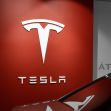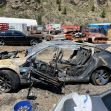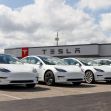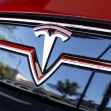A Florida judge has ruled that a lawsuit accusing Tesla of overpromising on its vehicle's Autopilot system can go to trial. The lawsuit was filed by Kim Banner when her husband, Jeremy Banner, was killed in 2019 after engaging the Autopilot system.
Banner was traveling on a South Florida road at about 70 mph when he activated his Tesla’s Autopilot system. Seconds after taking his hands on the steering wheel, Banner slammed into a semi-truck that turned onto his path.
His Tesla did not detect the truck, and neither the Autopilot system nor Banner adjusted the steering wheel to stay out of harm’s way. Banner crashed into the side of the 18-wheeler, causing the hood of his Tesla to shear off as he drove under the trailer.
Tesla filed a motion for the court to summarily dismiss Banner’s lawsuit, but Circuit Judge Reid Scott ruled that Banner’s legal team had produced enough evidence to support their claims sufficient to justify going to trial.
Judge Scott also found that Banner could pursue punitive damages along with compensatory damages. Unlike compensatory damages which are designed to compensate a victim or their surviving family members for financial losses and emotional harm, punitive damages are designed to punish a defendant for their especially negligent or reckless behavior. If awarded, the punitive damages could reach millions of dollars.
Banner’s 23-page lawsuit highlights other cases in which other Tesla drivers using the Autopilot system were involved in fatal crashes. The lawsuit maintained that the popular electric car company “created a foreseeable zone of risk that posed a general threat of harm to others.”
In rejecting Tesla’s motion to dismiss, Judge Scott also lent validity to the claim made by Banner’s attorneys that simply by naming the software system “Autopilot,” both Musk and Tesla implied that the system can operate on its own and does not require the full attention of the driver.
The company has shared in previous court filings that even with the Autopilot system being engaged, Tesla vehicles are not fully self-driving and that drivers will ultimately be responsible for steering and braking when needed.
Banner’s legal team also highlighted a 2016 marketing video that is still active on Tesla’s website that shows off the Autopilot system. In the video, a Tesla can be seen weaving through winding roads, avoiding other cars, cyclists and pedestrians, and adhering to stop signs and traffic lights. The video shows that the driver never touches the steering wheel or the pedals. A statement that follows reads, “The person in the driver's seat is only there for legal reasons. He is not doing anything. The car is driving itself.”
During questioning by Banner’s attorneys, Tesla employees defended the ad saying that the video was portraying proprietary mapping software that was not yet available to the public and that said the software “still performed poorly and even ran into a fence while filming."
Banner’s attorneys are making a case that Banner, like many other Tesla owners who engaged in Tesla’s marketing, was under a reasonable belief that his Tesla was capable of true self-driving functionality.
Banner’s representing attorney, Trey Lytal, issued a statement that explained Judge Scott’s ruling “shows how Tesla’s conduct was not just negligent, but involved intentional and reckless decisions that led to the death of customers, including Jeremy Banner.” Lytal adds, “The public is entitled to know these findings and we feel strongly that will happen in the next few weeks.”
The trucking company that was initially involved with the lawsuit settled with Banner’s widow in a confidential agreement and is no longer part of the lawsuit.






